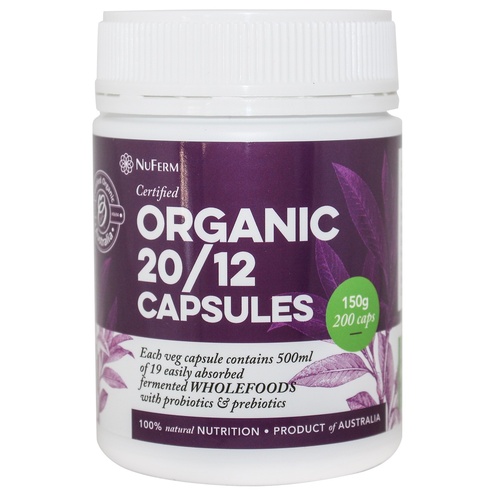


150 g (200 capsules)
A healthy digestive systems is full of bacteria, both 'friendly' and 'unfriendly'. The 'friendly' or probiotic bacteria should predominate. However this intricate ratio can become unbalanced due to poor eating habits, medication, antibiotics, tummy upsets, chemicals, stress and illness. Sign of bacteria imbalance include digestive problems, constipation or diarrhoea, food allergies & sensitivities, sugar and carbohydrate cravingsm, fatigue, acne, eczema, fungal infections, poor immune system, colds & flu, poor concentration and inflammatory disorders.
Food allergies are a major cause of gastrointestinal inflammation, as is the disturbance of good gut bacteria. This leads to an unbalanced digestive system making it more difficult to absorb the goodness from food eaten and even nutrient starvation. NuFerm 2012 blend helps replenish the 'friendly' intestinal flora for gut bacterial balance, essential for good digestion and a healthy bowel and immune system. NuFerm’s Organic 2012 Blend is a blend of non gluten wholefoods broken down by 12 strains of probiotics. The 20 living wholefoods are broken down (fermented) by lactobacilli bacteria to enhance the foods goodness. The bacteria naturally break the foods down to allow optimum nutrient absorption. Early trials indicate that the foods chosen for additional energy are proving to be very successful. Certified organic and made with selected non gluten wholefoods, in a readily absorbable format that combine billions of live probiotics from 12 key strains of friendly bacteria and naturally occurring vitamins, minerals, amino acids, essential fatty acids, phyto-nutreints & enzymes found in specially selected Wholefoods. NuFerm have used vege caps which are easily broken down, contain no binders or chemicals and is free from soy, gave, dairy, gluten, GMO, colours, flavours, fillers and preservatives.
Organic Ingredients
*The above foods have been through a licensed natural organic fermentation process using natural organic bacteria.
First time users - Start with 1 capsule per day for two days, then gradually increase to 4 capsules per day. Daily use - 4 capsules (2 capsules on rising and 2 before bed)
For delivery, see Sassy Organics' Delivery Information Page.
For returns, see Sassy Organics' Returns & Refunds Page.